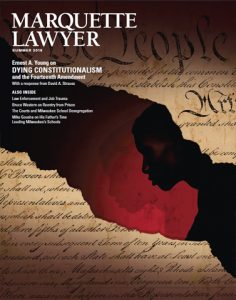MULS Legal Education: Following Footsteps and Forging Your Own Path


When I was asked if I would—together with my daughter Micaela—write a blog for the Marquette University Law School Faculty Blog, I wanted to make sure it was known I haven’t practiced law full-time in fifteen years. So, fair warning, this is not going to be a technical legal discussion.
Let’s start with a short background: I graduated from MULS in 1989. In fact, I just celebrated my thirty-year reunion (quick shout out to my classmates: You guys rock! We had the highest turnout of any reunion class!). It was wonderful catching up with old friends, some I have kept in touch with; regrettably, some I have not.
As I stood in the Zilber Forum (as I have done several times previously, more on that later), I reflected on my law school experience at Sensenbrenner Hall, and, despite feeling envious of the students who are privileged to study law in such a marvelous facility, was transported in back thirty years to the year I graduated from MULS. I remember the hope, the promise, coupled with the uncertainty and anxiety I was feeling at the time. Not to mention the excitement of my impending marriage one month later to my beautiful wife of thirty years, Ellen, whom I met while we were both studying at Marquette (she was earning her Masters in Analytical Chemistry at the time).
Flash forward thirty years and imagine my pride when Micaela announced to us that she would be attending MULS. In fact, Micaela is officially a 3L and is on track to graduate in May 2020. While it may not be shocking for a child to follow in a parent’s footsteps, it didn’t look like that would be happening with Micaela.

 A
A  The Summer 2019 issue of
The Summer 2019 issue of